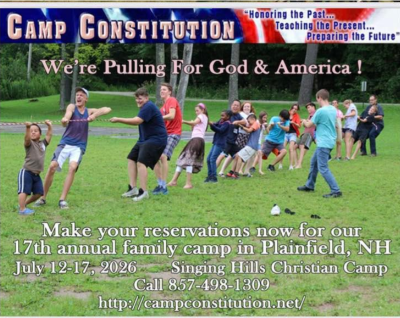Many may not know it, but today the "shot heard round the world" was sounded on this day in 1775.
That storied shot is said to have come during a Concord, Mass., battle between King George's army and Massachusetts militiamen.
Technically, however the first shot of what was to become the War for Independence was fired at Lexington Green earlier in the day not long after dawn.
That's where 700 elite British soldiers - marching toward Concord - had a brief skirmish which killed eight colonists and wounded nine more. The King's troops marched on, arriving at Concord two hours later. While some troops searched the town for stores of gunpowder and arms, three companies guarded the "North Bridge." As the British were marching toward Concord, word spread of the fight at Lexington.
Alarm bells rang calling out the militia and Minute Men across Middlesex County. Among the units to muster was Colonel James Barrett's Middlesex County Regiment of Minute Men.
Once in formation the regiment moved onto a hill within 500 yards of where the British stood watch at North Bridge. Colonel Barrett, needing to organize additional militia companies, left his command to Major John Buttrick.
When smoke appeared in the sky above Concord the Americans wrongly believed the British were burning the town. In response Buttrick decided to move his men toward the town.
As the Americans advanced the British pickets fell back across the bridge. The last British unit to cross, the Light Company of the 4th (King's Own) Foot, stopped to tear up some of the planks to delay the militia advance. Leading the American column was Captain Isaac Davis's Company of Minute Men from Acton.
As they got within 50 yards of the bridge Buttrick shouted at the British to stop tearing up the planks.
Suddenly three British shots were fired, killing Davis and another man instantly and wounding a third. Buttrick shouted "Fire! For God's sake Fire!" and the Minute Men unloosed a ragged but heavy volley.
Four out of eight British officers were hit along with seven enlisted men, two of whom died. The British immediately fell back toward the town where they linked up with other Royal troops.
Buttrick moved his men across the bridge as the British column began marching back down the road toward Boston. Militiamen gathered along their path and soon began firing from behind trees and stone walls, inflicting an ever-increasing number of casualties. When the exhausted British troops reached Lexington, scene of the fight earlier that morning, they were met by a relief force sent to accompany them back to Boston. However, the Americans did not stop their attacks, inflicting additional losses on the British column before it reached Boston. In total the British suffered almost 300 dead, wounded or missing.
In this day and age when so much about the beginnings of America are degraded or even ignored in schools nationwide, it's important to remember the bravery of our country's forebears.
There was so much selfless bravery that day it inspired the great poet, Henry Wadsworth Longfellow to write his celebrated poem, "The Midnight Ride of Paul Revere" which can be seen below.
Wikimedia Commons material contributed to the above copy
Paul Revere's Ride
By Henry Wadsworth Longfellow
LISTEN, my children, and you shall hear
Of the midnight ride of Paul Revere,
On the eighteenth of April, in Seventy-five;
Hardly a man is now alive
Who remembers that famous day and year.
He said to his friend, "If the British march
By land or sea from the town to-night,
Hang a lantern aloft in the belfry arch
Of the North Church tower as a signal light, --
One, if by land, and two, if by sea;
And I on the opposite shore will be,
Ready to ride and spread the alarm
Through every Middlesex village and farm,
For the country folk to be up and to arm."
Then he said, "Good night!" and with muffled oar
Silently rowed to the Charlestown shore,
Just as the moon rose over the bay,
Where swinging wide at her moorings lay
The Somerset, British man-of-war;
A phantom ship, with each mast and spar
Across the moon like a prison bar,
And a huge black hulk, that was magnified
By its own reflection in the tide.
Meanwhile, his friend, through alley and street,
Wanders and watches with eager ears,
Till in the silence around him he hears
The muster of men at the barrack door,
The sound of arms, and the tramp of feet,
And the measured tread of the grenadiers,
Marching down to their boats on the shore.
Then he climbed the tower of the Old North Church,
By the wooden stairs, with stealthy tread,
To the belfry-chamber overhead,
And startled the pigeons from their perch
On the sombre rafters, that round him made
Masses and moving shapes of shade, --
By the trembling ladder, steep and tall,
To the highest window in the wall,
Where he paused to listen and look down
A moment on the roofs of the town,
And the moonlight flowing over all.
Beneath, in the churchyard, lay the dead,
In their night-encampment on the hill,
Wrapped in silence so deep and still
That he could hear, like a sentinel's tread,
The watchful night-wind, as it went
Creeping along from tent to tent,
And seeming to whisper, "All is well!"
A moment only he feels the spell
Of the place and the hour, and the secret dread
Of the lonely belfry and the dead;
For suddenly all his thoughts are bent
On a shadowy something far away,
Where the river widens to meet the bay, --
A line of black that bends and floats
On the rising tide, like a bridge of boats.
Meanwhile, impatient to mount and ride,
Booted and spurred, with a heavy stride
On the opposite shore walked Paul Revere.
Now he patted his horse's side,
Now gazed at the landscape far and near,
Then, impetuous, stamped the earth,
And turned and tightened his saddle-girth;
But mostly he watched with eager search
The belfry-tower of the Old North Church,
As it rose above the graves on the hill,
Lonely and spectral and sombre and still.
And lo! as he looks, on the belfry's height
A glimmer, and then a gleam of light!
He springs to the saddle, the bridle he turns,
But lingers and gazes, till full on his sight
A second lamp in the belfry burns!
A hurry of hoofs in a village street,
A shape in the moonlight, a bulk in the dark,
And beneath, from the pebbles, in passing, a spark
Struck out by a steed flying fearless and fleet:
That was all! And yet, through the gloom and the light,
The fate of a nation was riding that night;
And the spark struck out by that steed, in his flight,
Kindled the land into flame with its heat.
He has left the village and mounted the steep,
And beneath him, tranquil and broad and deep,
Is the Mystic, meeting the ocean tides;
And under the alders that skirt its edge,
Now soft on the sand, now loud on the ledge,
Is heard the tramp of his steed as he rides.
It was twelve by the village clock,
When he crossed the bridge into Medford town.
He heard the crowing of the cock,
And the barking of the farmer's dog,
And felt the damp of the river fog,
That rises after the sun goes down.
It was one by the village clock,
When he galloped into Lexington.
He saw the gilded weathercock
Swim in the moonlight as he passed,
And the meeting-house windows, blank and bare,
Gaze at him with a spectral glare,
As if they already stood aghast
At the bloody work they would look upon.
It was two by the village clock,
When he came to the bridge in Concord town.
He heard the bleating of the flock,
And the twitter of birds among the trees,
And felt the breath of the morning breeze
Blowing over the meadows brown.
And one was safe and asleep in his bed
Who at the bridge would be first to fall,
Who that day would be lying dead,
Pierced by a British musket-ball.
You know the rest. In the books you have read,
How the British Regulars fired and fled, --
How the farmers gave them ball for ball,
From behind each fence and farm-yard wall,
Chasing the red-coats down the lane,
Then crossing the fields to emerge again
Under the trees at the turn of the road,
And only pausing to fire and load.
So through the night rode Paul Revere;
And so through the night went his cry of alarm
To every Middlesex village and farm, --
A cry of defiance and not of fear,
A voice in the darkness, a knock at the door,
And a word that shall echo forevermore!
For, borne on the night-wind of the Past,
Through all our history, to the last,
In the hour of darkness and peril and need,
The people will waken and listen to hear
The hurrying hoof-beats of that steed,
And the midnight message of Paul Revere.
From The Complete Poetical Works of Henry Wadsworth Longfellow, 1903














